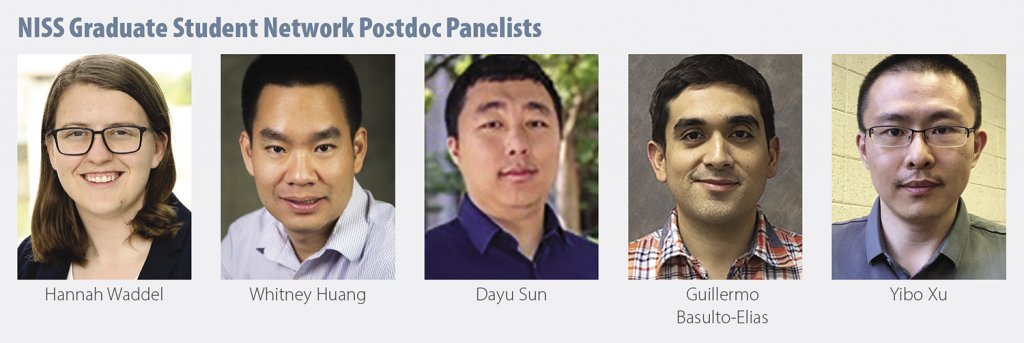Megan Glenn, Administration Assistant, National Institute of Statistical Sciences
The NISS Graduate Student Network (GSN) hosted a panel discussion January 27 for those wanting to learn about postdoctoral positions in statistics. The panel of current and former postdoctoral fellows shared their reasons for considering a postdoctoral position after graduation.
Panelists included Whitney Huang (former postdoc), assistant professor in the Clemson University Department of Mathematics and Statistics; Dayu Sun, postdoctoral fellow in the Emory University Department of Biostatistics; Yibo Xu, postdoctoral fellow in the Clemson University Department of Mathematics and Statistics; and Guillermo Basulto-Elias of the Center for Transportation Research and Education at Iowa State University. Hannah Waddel, biostatistics and bioinformatics graduate student at Emory University and NISS Graduate Student Network Executive Committee member, moderated the discussion.
When asked why the panelists decided to take a postdoc position, Huang mentioned he wanted to go into academia and needed more experience after graduating. Huang’s postdoc experience was different from a typical postdoc, however. In his position at the Statistical and Applied Mathematical Sciences Institute, he helped organize and run the program he worked for, including organizing working groups and reporting back to the National Science Foundation.
Will there be any more postdoc sessions?
The NISS Graduate Student Network is not holding anymore postdoctoral panel sessions, but we have other upcoming events that will be of interest to graduate students. To stay in touch, fill out the form.
Is there a good season to find a postdoc?
Postdoctoral positions are posted year-round. The panelists recommended beginning your postdoc search as soon as you are able and consider varying factors such as your anticipated graduation time, immigration and visa, and research interests.
What other sources exist to find a position?
Our panelists recommended the University of Florida’s statistics jobs website, MathJobs.org, and the ASA forums. They also recommended keeping an eye on postings through social media such as LinkedIn and Twitter. The National Institute of Statistical Sciences careers page lists current postdoc positions and offers postdoc positions.
Sun, like Huang, wanted to go into academia after graduating but took an internship in industry, where he realized he didn’t fit. He was assigned projects but wanted to work independently as a researcher. Sun went for a postdoc position to broaden his research horizon, which later benefitted his career.
Basulto-Elias saw his postdoc position as a good opportunity to test whether applied statistics was his calling, because he thinks it’s interesting. Answering questions with data science is something he enjoys.
Xu took a postdoc position thinking that—to have success on the academic track—one is expected to take a postdoc position before obtaining a tenure-track position. He took the opportunity and planned to enhance his research expertise.
The panelists also offered advice about what a student should know before applying for a postdoc position. One benefit is that—in the 2–3-year position supported by a principal investigator (PI)—a supervisor will check on your research progress, tell you whether your performance is satisfactory, and let you know how you can improve.
“In preparing yourself to be successful in the true tenure-track positions, you need to balance both research and teaching aspects,” Xu said.
Each of the panelists discussed some of the pros and cons of postdoc positions and the qualities needed or that are useful.
Xu spoke about the expectations of postdoc positions, not only research expectations but also production and teaching expectations. His advice to prospective postdocs is to put more effort into networking, communicating, and research proposals.
Sun added that independent research abilities are also important. Postdoctoral positions require solving many problems independently, and the supervisor will not hold the researcher’s hand at every step.
Huang expressed the value of networking. “You want to be very active and let people see you,” he said. “Besides the research, you need to let people know that you are active in events.”
There is a big jump from being a student to becoming a postdoc. One needs to learn how to submit to institutional review boards and meet specific, hard deadlines.
The panelists also spoke about whether postdoc positions would sponsor visas. Basulto-Elias is from Mexico and earned his PhD from the US. He was given a student visa with permission to work here for three years, and then he was able to switch to an H-1B visa with no major obstacles. In nonacademic positions, applicants have to go through a lottery for a visa.
Panelists also noted that a postdoc position is not the right choice for everyone. For instance, depending on the field, postdoc positions may not benefit long-term career goals. The pay might be too low for those who need more financial support. And a postdoc position would not be a good fit for someone who does not like doing heavy research.




Leave a Reply